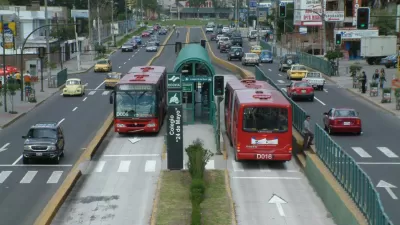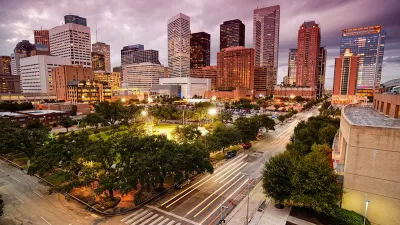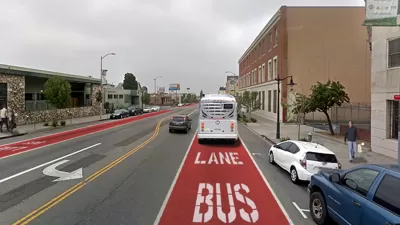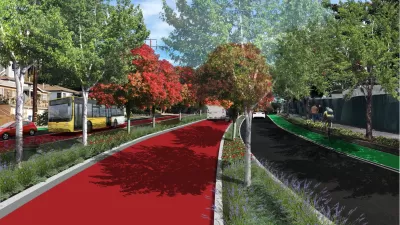As cities look to rebuild their transit systems, bus rapid transit provides a cheap and effective way to expand access and boost speed.

More cities are starting to look to bus rapid transit, known as BRT, to improve their transit options and make routes more efficient, reports Ian Duncan. "The lines take the humblest form of public transit, the city bus, and supercharge it using a combination of technology, road redesigns and route planning tweaks." BRT projects "are particularly appealing in smaller urban areas and the less dense communities that dominate the American landscape where subways and light rails are hard to justify."
Some experts, however, caution that "many lines that are dubbed BRTs involve only limited upgrades to bus service. They say those kinds of lines are not likely to tame urban sprawl or lure suburban drivers out of their cars." While "[t]he most elaborate systems involve dedicated busways with stops that mimic a light-rail station and facilities to buy tickets on the street, as well as speeds that can rival rail. But many such bus lines in the United States are more basic, largely involving stops that are further apart and technology that changes stop lights to green as buses approach."
Meanwhile, "[s]ome warn that betting on a form of transit well suited to America’s road-dominated cities and suburbs could be counterproductive: an unhappy middle way that offers modestly better service and does not promote the kind of denser communities that allow transit to thrive." But "[t]here are indications that BRT lines can promote some of the density long associated with rail routes," and, in the meantime, can more effectively connect people to jobs and amenities for a fraction of the cost of rail.
FULL STORY: Cities are turning to supercharged bus routes to more quickly and cheaply expand transit services

Maui's Vacation Rental Debate Turns Ugly
Verbal attacks, misinformation campaigns and fistfights plague a high-stakes debate to convert thousands of vacation rentals into long-term housing.

Planetizen Federal Action Tracker
A weekly monitor of how Trump’s orders and actions are impacting planners and planning in America.

In Urban Planning, AI Prompting Could be the New Design Thinking
Creativity has long been key to great urban design. What if we see AI as our new creative partner?

King County Supportive Housing Program Offers Hope for Unhoused Residents
The county is taking a ‘Housing First’ approach that prioritizes getting people into housing, then offering wraparound supportive services.

Researchers Use AI to Get Clearer Picture of US Housing
Analysts are using artificial intelligence to supercharge their research by allowing them to comb through data faster. Though these AI tools can be error prone, they save time and housing researchers are optimistic about the future.

Making Shared Micromobility More Inclusive
Cities and shared mobility system operators can do more to include people with disabilities in planning and operations, per a new report.
Urban Design for Planners 1: Software Tools
This six-course series explores essential urban design concepts using open source software and equips planners with the tools they need to participate fully in the urban design process.
Planning for Universal Design
Learn the tools for implementing Universal Design in planning regulations.
planning NEXT
Appalachian Highlands Housing Partners
Mpact (founded as Rail~Volution)
City of Camden Redevelopment Agency
City of Astoria
City of Portland
City of Laramie





























